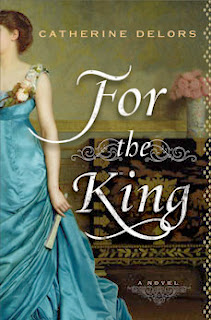Reviewed by: L. Gregory Graham
Etienne is a simple man. What he wants most in life is a profession that is less hard on his hands. His sobriquet, Fatfingers, comes from the damage he does to his digits as a carpenter. Unfortunately, Nova Scotia in 1755 is not a place where the British care much about what an Acadian wants. England, Spain, and France are fighting over large chunks of North America, and if a few settlers die in the process, then so be it.
Pretty grim, right? In fact, the story is a romp through an unsettled period that rings truer in this book than it does in the history books.
The widow Partridge was a comely sort of woman, who having lost her husband to a wasting fever at the age of twenty, cultivated a lost and melancholic air that left persons of the opposite sex strangely disoriented.
That is how a very minor character in the story is described.
It was the type of air that, once having breathed it, you had to sample it again to see if it was as bad as you first thought.
That is how the smell inside an Indian lodge house is described.
Yes, it is a funny book. How does funny mix with historical novel? It mixes very well in this case. There is no time for stoical heroes, or bosomy heroines. This book deals with practical questions like who do you pay off when the French have vacated the city, and the Spanish haven’t arrived yet? Or, where do you get the flour for his bread when the Spanish governor eats at your restaurant every evening?
Etienne does what he must to survive and thus begins a story that stretches from Nova Scotia to New Orleans with side trips to South Carolina, Florida, Haiti and Cuba thrown in. Along the way he collects a motley group of characters that hang together because none of them has had a better offer. They include a former mistress to a government official in Haiti, a Spanish journalist sent to Cuba to get her out of Spain, an Indian, a former pirate turned food inspector, a former ship’s captain who may or may not be a pirate, smugglers and, of course, a boat load of angry Spanish prostitutes.
The city of New Orleans is a character also. It is a malevolent place much prone to giving its inhabitants incurable diseases, where anything left untended succumbs to rot, or sinks out of sight in the firm mud that passes for dry land. It is an immoral place where the major economic activity is smuggling. Drinking, rioting and knife fights are the entertainment. The city resists all attempts by the various authorities to bring law and order to the masses. One gets the impression that it was named New Orleans only because the names Sodom and Gomorrah had already been taken.
Etienne is pragmatic; he opens a restaurant, makes excellent food, and pays off anyone who comes through the door demanding a bribe. Unfortunately, nothing stays simple for long. Soon he becomes a smuggler to buy flour from the British to make the rolls and breads that governor craves in his restaurant. His brother-in-law, the Indian, is wounded on a smuggling run requiring that they kidnap a surgeon from Pensacola; the woman he loves is accused of murder and witchcraft requiring a rescue from a prison ship in Havana harbor; half-hearted revolutionaries plot government overthrow at dinner at his restaurant; and a Yankee bounty hunter by the name of Cudgel tirelessly dogs him at every step.
Etienne finds himself in a topsy-turvy world. Bravery and ethical behavior are punished while lying, slander, smuggling, cowardice, and drinking carry the day. Money and power are always corrupt, and the guilty must be punished even when they are not guilty. Where others see moral turpitude, Etienne sees opportunity.
As busy as he is trying to stay alive, Etienne still finds time to invent Cajun cooking, and develop the perfect mixed drink for Kentucky bourbon if only he could remember the ingredients the next morning. Yes, it is that kind of book.
I would heartily recommend this book to anyone who is tired of the standard fare in historical novels. These characters come off fresh and funny. The women rescue the men, the men rescue the women, Etienne becomes a hero only after every other option is closed to him, government at its worst is subverted, and life goes on in a tiny town on a small rise beside a very muddy river.
 A continuation of Jane Austen's Pride and Prejudice, Sharon Lathan's fourth book, In the Arms of Mr. Darcy, brings us into the daily lives of Fitzwilliam Darcy and his wife, Elizabeth, as they learn to cope with the trials and joys of parenthood.
A continuation of Jane Austen's Pride and Prejudice, Sharon Lathan's fourth book, In the Arms of Mr. Darcy, brings us into the daily lives of Fitzwilliam Darcy and his wife, Elizabeth, as they learn to cope with the trials and joys of parenthood.









